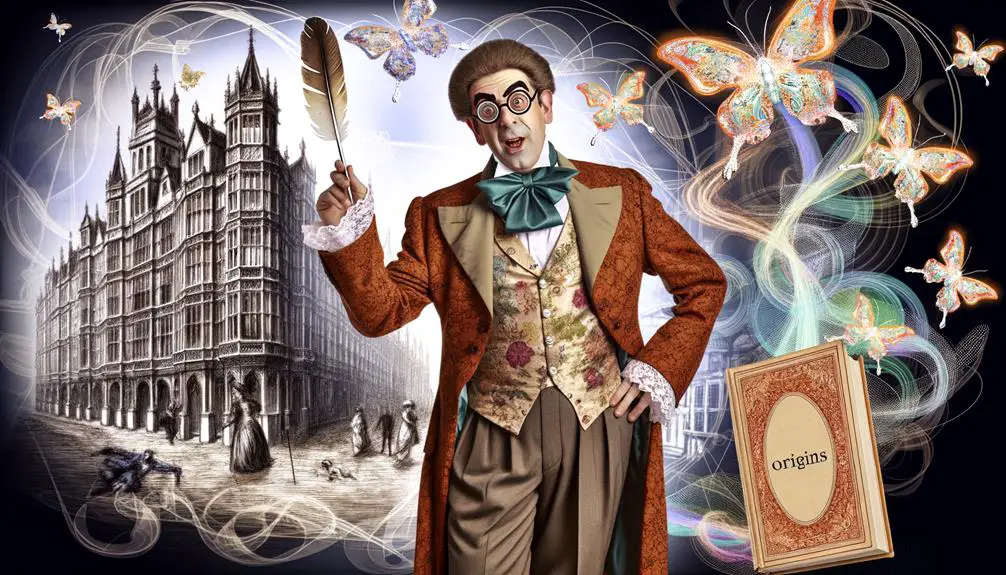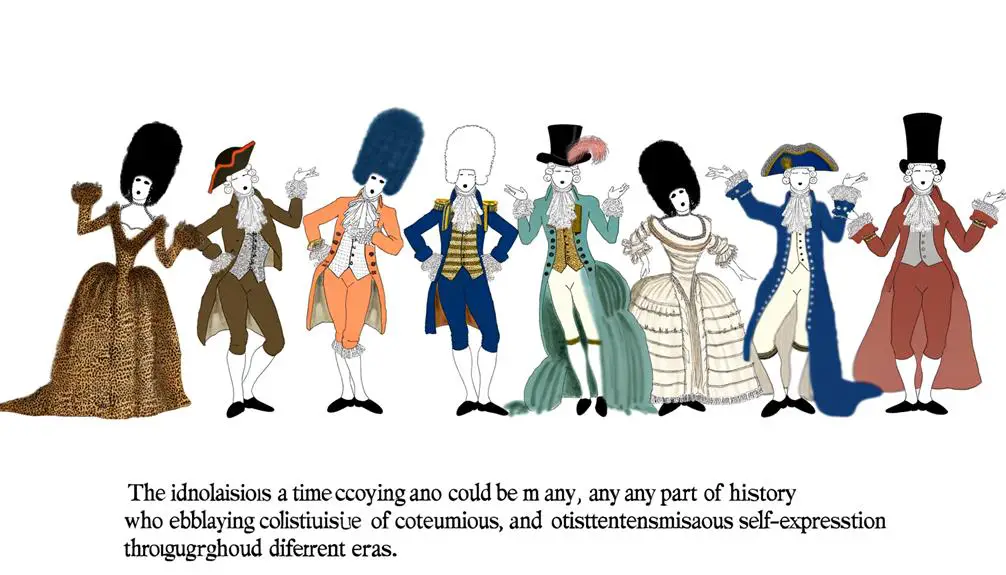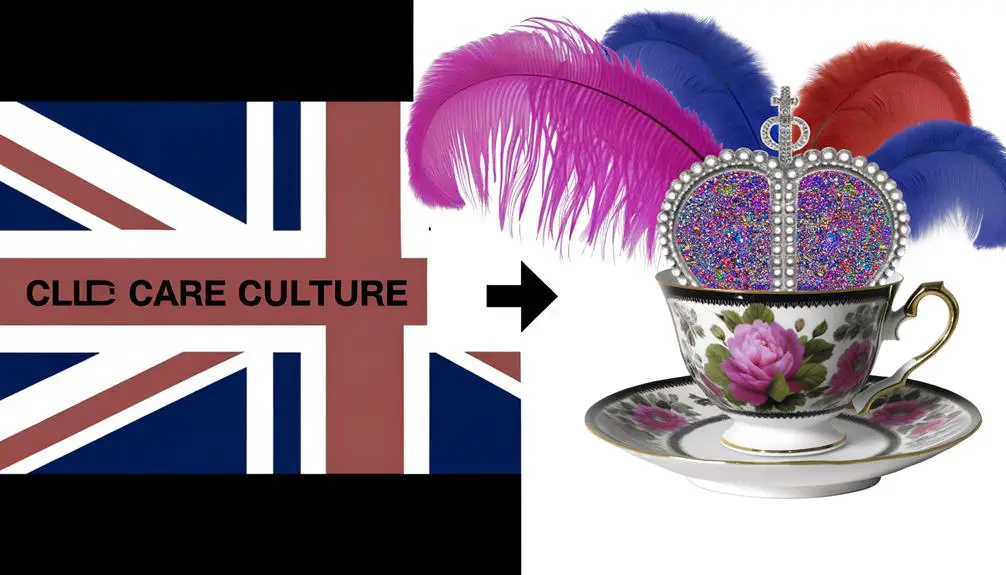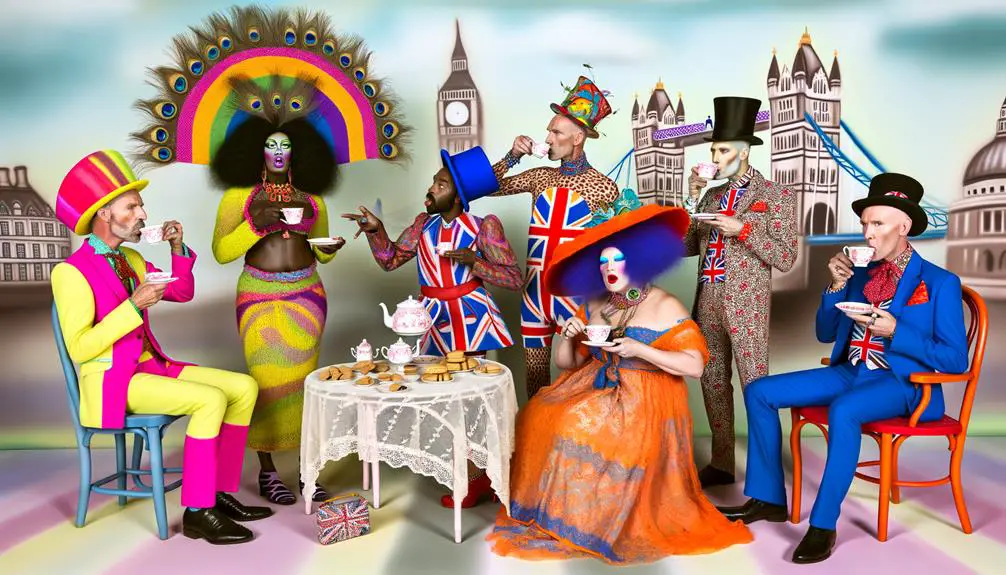In British slang, 'camp' signifies more than mere flamboyance. You're looking at a term rooted in early 20th-century aesthetics, embodying irony, theatricality, and a playful challenge to gender norms. It's intimately connected with sexual ambiguity and queer subcultures, thriving on the extravagant. Over time, 'camp' has evolved, dissecting societal misconceptions and embracing a diverse and inclusive perspective. It's not just about being ostentatious; it's a sophisticated, ironic cultural commentary that pushes boundaries and redefines beauty standards. Exploring 'camp' unravels layers of cultural commentary and societal shifts, inviting a deeper understanding of its impact and significance.
Key Takeaways
- Camp in British slang refers to exaggerated, theatrical behavior often linked to irony and aestheticism.
- It challenges traditional gender norms, embracing fluidity and redefining beauty standards.
- Historically associated with queer subcultures, camp embodies sexual ambiguity and subversion.
- Camp thrives on the extravagant and ostentatious, celebrating non-conformity and flamboyance.
- It acts as a form of cultural commentary, reflecting and challenging societal perceptions of identity and expression.
The Origins of Camp

Tracing back to the early 20th century, the term 'camp' has evolved in the English lexicon, embodying a unique blend of irony, aestheticism, and theatricality within cultural and social contexts. You'll find that its etymology is as layered as the concept itself, with 'camp' historically linked to actions and attitudes perceived as exaggerated or affected, often for comedic or dramatic effect. Initially, the term was ensconced within the domains of sexual ambiguity and queer subcultures, lending it a veneer of outsider artistry that mainstream society found both baffling and intriguing.
As you explore further, you'll discover that camp's cultural influences are vast and varied, drawing from literary, cinematic, and fashion domains to shape its identity. It's a mode of expression that thrives on the margins, challenging traditional notions of taste and beauty through its embrace of the extravagant and the ostentatious. The camp's evolution reflects broader shifts in societal attitudes toward gender, sexuality, and identity, making it a fascinating lens through which to investigate the complexities of cultural dialogue and exchange.
Understanding camp's origins requires a nuanced appreciation of how it has both mirrored and mocked the cultural zeitgeist, serving as a barometer for evolving social norms and aesthetic values.
Defining Camp in British Slang
In British slang, 'camp' denotes a style characterized by exaggerated theatricality and irony, often employed to challenge conventional norms of gender and aesthetics. This nuanced term has evolved to encapsulate various modern interpretations and linguistic variations, reflecting societal shifts in understanding gender and performance.
| Aspect | Explanation |
|---|---|
| Theatricality | Camp embraces a performative nature, often exaggerating gestures, speech, and attire to create a spectacle. |
| Irony | It utilizes irony to subvert traditional expectations, using humor and wit to critique and play with norms. |
| Gender Norms | By challenging gender conventions, camp acts as a form of expression that defies rigid categorizations, celebrating fluidity. |
| Aesthetic | Its aesthetic is marked by a deliberate embrace of what might traditionally be considered kitsch, gaudy, or in bad taste, thereby redefining beauty standards. |
Through this lens, 'camp' can be seen as a dynamic form of cultural commentary, constantly adapting to reflect and question the prevailing ethos of its time. The term's usage within British slang not only highlights its inherent flexibility but also underscores the cultural specificity of its application, offering insights into the UK's unique socio-cultural landscape.
Camps Evolution Over Time

Over time, 'camp' has transformed considerably, showcasing broader societal changes in attitudes towards gender and performance. Initially seen through a narrow lens, often misunderstood as simply flamboyant or excessively theatrical behavior tied strictly to LGBTQ+ communities, the concept of camp has evolved into a more nuanced understanding. It's crucial to dissect camp misconceptions that have historically clouded its appreciation. Camp isn't just about extravagance for its own sake; it's a deliberate, sophisticated form of expression that challenges conventional norms.
Global influences have played a crucial role in shaping the perception of camp. As cultures intermingle, what defines camp has broadened, absorbing diverse aesthetic and performance traditions. This global exchange has enriched the camp's vocabulary, enabling it to be a more inclusive and multifaceted expression. This highlights camp's resilience and adaptability, reflecting an ever-evolving dialogue about identity, artistry, and resistance.
Analyzing camp's evolution requires an acknowledgment of its complex layers and the shifting societal landscapes it navigates. By embracing a broader, more inclusive definition, we begin to appreciate camp's depth and its critical role in challenging and redefining cultural norms.
Examples of Camp in Popular Culture
Camp's manifestation in popular culture offers a vivid tableau for examining its influence and evolution across various media platforms. Iconic performances and fashion statements serve as the primary vehicles through which camp's aesthetic sensibilities are communicated, reflecting its inherent irony, exaggeration, and playful subversion of traditional norms. Through the lens of British slang, camp in popular culture isn't just about flamboyance or theatricality; it's a complex commentary on society's conventions, often wrapped in humor and spectacle.
Consider the world of film and television, where characters and narratives steeped in camp invite viewers into domains of heightened reality. These are not mere entertainments but intricate tapestries woven with threads of satire, parody, and an unabashed celebration of difference. The music industry, too, has been a fertile ground for camp's expression. Artists don elaborate costumes and personas, crafting performances that are as much about the spectacle as they are about the music itself.
In fashion, camp finds a particularly resonant echo, with designers and wearers alike embracing its ethos to challenge and redefine beauty standards. Through exaggerated silhouettes, bold colors, and unexpected material juxtapositions, fashion becomes a dynamic canvas for camp's playful critique of aesthetic norms. This interplay between iconic performances and fashion statements underlines camp's enduring relevance and transformative potential within popular culture.
The Impact of Camp on Society

The societal fabric has been greatly altered by camp's audacious influence, weaving threads of satire and subversion into the mainstream's once-monolithic perceptions of identity and expression. This phenomenon has not only emboldened diverse forms of self-expression but also ignited camp controversies, challenging traditional norms and provoking dialogue on the fluidity of culture and the boundaries of taste. You've witnessed how camp's deliberate exaggeration and playful irreverence have served as a mirror, reflecting societal taboos and biases, thereby fostering a more expansive societal acceptance of difference.
Analytically, the impact of camp on society extends beyond mere aesthetics or entertainment. It acts as a catalyst for critical discussions on authenticity, artifice, and the performance of identity. Through its embrace of contradiction and complexity, camp encourages you to question and dismantle rigid categorizations, making space for more nuanced understandings of identity. Societal acceptance of camp signals a shift towards a culture that values diversity and the interrogation of norms, suggesting that the controversies stirred by camp are essential to its role as an agent of change. Ultimately, camp's influence underscores the transformative power of embracing the unconventional, pushing society towards broader inclusivity and understanding.







